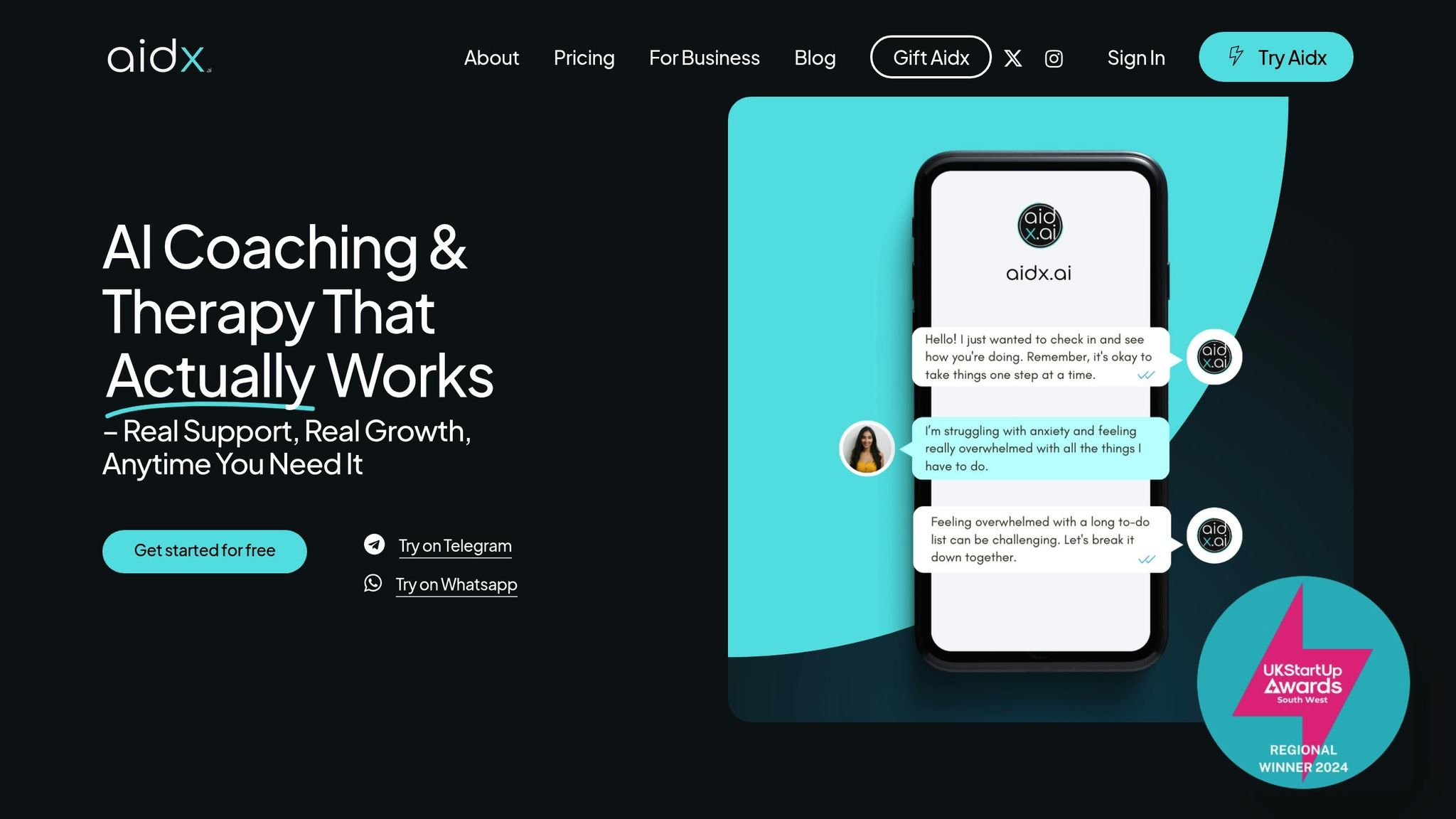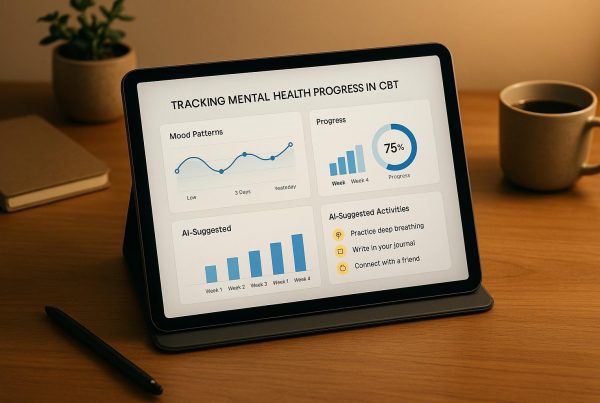AI is transforming career transitions by offering 24/7 personalized guidance, real-time progress tracking, and cost-effective solutions. Unlike traditional methods, which rely on in-person sessions and slow feedback, AI tools like Aidx.ai provide instant support, customized plans, and continuous monitoring – all for just $20/month (or $15/month annually). These tools integrate proven techniques like CBT and NLP, making career planning faster and more accessible.
Key Benefits of AI for Career Planning:
- Availability: Get help anytime, no scheduling needed.
- Cost: Save up to 80% compared to traditional coaching.
- Personalization: Tailored plans based on your needs.
- Feedback: Real-time updates and adjustments.
- Privacy: No stigma; men are 3× more likely to use AI tools.
| Feature | Traditional Methods | AI Tools (e.g., Aidx.ai) |
|---|---|---|
| Availability | Limited to business hours | 24/7 instant access |
| Cost | High | $20/month |
| Personalization | Generic templates | Data-driven, tailored plans |
| Progress Tracking | Manual, periodic reviews | Continuous, real-time |
AI tools simplify career transitions, offering faster, cheaper, and more effective support compared to traditional methods.
The AI Goal-Setting Hack That Will Change Your Life: My …
1. Standard Goal-Setting Steps
Traditional goal-setting methods are thorough but often require a lot of time and resources, making them challenging for those with tight schedules or budgets.
The process typically begins with an initial self-assessment. This involves using tools like personality tests and skills inventories, which can be expensive, especially when professional guidance is needed.
The next step is creating a goal framework. This usually involves scheduling in-person meetings, which can be inconvenient. In fact, research shows that about 50% of people face difficulties finding suitable appointment times [1], causing delays in moving forward.
Once the framework is in place, tracking progress becomes crucial. However, manual tracking methods make it harder to get real-time feedback or make quick adjustments when needed.
While these methods offer a solid starting point, their drawbacks – such as scheduling challenges, high costs, and slow feedback – can make career transitions more difficult. These challenges highlight the potential for AI-driven tools to simplify and speed up the goal-setting process.
sbb-itb-d5e73b4
2. AI Tools in Goal Planning (e.g., Aidx.ai)

Modern AI tools are reshaping how we approach goal-setting, offering practical solutions to the challenges of traditional methods. These tools are making career transitions easier by providing instant, personalized guidance at a fraction of the usual cost.
Tailored Goal Development
Platforms like Aidx.ai use methods grounded in evidence, such as CBT, DBT, and NLP, to craft personalized career transition plans. Whether you need a quick 5-minute coaching session or a more detailed strategy, the platform adjusts to your specific needs.
Ongoing Tracking and Real-Time Adjustments
Forget the outdated approach of periodic check-ins. AI tools like Aidx.ai allow you to monitor progress continuously. Its built-in planner includes reminders, note-taking, and goal-tracking features to keep you on track. The "Friday Wins & Monday Goal-Setting" feature helps users regularly review achievements and set new objectives, creating a steady rhythm for self-improvement.
Affordable Professional Guidance
Traditional career coaching can be expensive, but AI platforms have drastically cut costs – up to 80% less. Aidx.ai, for instance, offers a full suite of tools for just $20 a month, or $15 per month with an annual plan [1].
Always Available
One major advantage of AI tools is their 24/7 accessibility. Aidx.ai connects with messaging apps like WhatsApp and Telegram, allowing users to get guidance anytime. This feature is especially helpful for the nearly 50% of therapy seekers who struggle with scheduling availability [1].
Benefits and Limitations
Looking at traditional and AI-driven approaches side by side highlights their impact on career transitions. Here’s a closer look at the advantages and challenges of each method:
| Aspect | Traditional Methods | AI-Powered Tools (e.g., Aidx.ai) |
|---|---|---|
| Availability | Limited to business hours; scheduling required | 24/7 access; instant support [1] |
| Cost | High cost | About 80% cheaper ($20/month) [1] |
| Personalization | Relies on generic templates and frameworks | Data-driven, tailored guidance |
| Progress Tracking | Manual tracking and periodic reviews | Digital tracking with real-time updates |
| Response Time | Days or weeks between sessions | Immediate feedback and adjustments |
| Privacy Concerns | Potential stigma in face-to-face sessions | Greater privacy; men are 3× more likely to open up [1] |
Additional Benefits
AI tools bring other helpful features to the table:
- Consistent Support: Regular reminders and check-ins keep users on track during their career transitions.
- Private Environment: Encourages open communication without fear of judgment.
Limitations
While AI-powered tools offer many advantages, they also come with a few drawbacks:
- Complex Situations: Some scenarios may still need human intuition and expertise.
- Technology Dependence: A stable internet connection and basic tech skills are required.
- Learning Curve: Users might need some time to get comfortable with the platform’s features.
By incorporating evidence-based practices like CBT, DBT, and NLP, AI platforms ensure users get scientifically supported guidance while enjoying the convenience of digital tools.
"I found its timely and personalised email reminders to be useful to help me reflect on previous problems and also to remind me to seek help again when needed… It also helped me to see things from a different perspective, reminded me how to problem-solve for myself, and gave me reassurance that there was support that I could rely on (any time of the day or night) if and when I needed it." – Cleo Brooks, Psychologist & Mental Health Clinician [1]
Key Findings
Our comparison highlights how AI-driven goal-setting outperforms traditional methods in terms of speed, personalization, and accessibility.
AI-based tools are proving to be a game-changer, especially for career development. For example, male professionals are three times more likely to use AI tools compared to traditional counseling methods [1]. This shift underscores the growing role of AI in reshaping how people approach career planning.
Here’s how AI tools improve key areas of career planning:
| Impact Area | Traditional Methods | AI-Enhanced Approach |
|---|---|---|
| Response Time | Days to weeks | Immediate, 24/7 access |
| Cost Efficiency | Standard sessions | Around 80% cost reduction |
| Progress Tracking | Periodic check-ins | Continuous monitoring |
These advancements lead to a smoother experience during career transitions. By combining proven techniques like CBT, DBT, and solution-focused therapy with AI’s capabilities, users gain structured, adaptable support. AI tools deliver instant, judgment-free assistance during critical moments, while also tracking progress consistently. This complements the strategic depth of traditional methods.
Altogether, these findings show that AI platforms not only address the limitations of traditional approaches but also provide a more tailored and proactive way to navigate career changes.
"My experience with aidx was impressive, it offered great support and ideas, was able to have fluent conversations, on top of that it checked in with me… it is a brilliant tool for anyone who needs support quickly and maybe hasn’t found their therapist yet or can’t afford a session for the moment. It is truly game changing and will shake the industry very quickly." – Salvija, Abuse Expert and Clinical Hypnotherapist [1]



